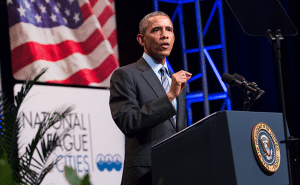
Climate change has global consequences including greater instability and more extreme storms that will impact the readiness of United States military forces, requiring them to consider the effects of changing conditions in their plans and operations, President Barack Obama said on Wednesday.Civil wars, humanitarian missions, melting sea ice, and coastal flooding can be indirectly or directly tied to climate change, threatening America’s national, homeland and economic security, Obama said during his commencement address in New London, Conn., to new Coast…

 By
By 








